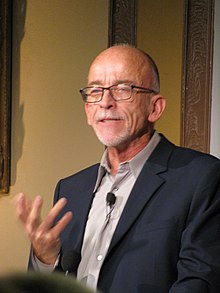Mark Doty
| Mark Doty PYT | |
|---|---|
 |
|
| Born |
August 10, 1953 Maryville, Tennessee |
| Nationality | American |
| Alma mater |
Drake University; Goddard College |
| Genre | Poetry |
| Notable awards | National Book Award for Poetry |
Mark Doty (born August 10, 1953) is an American poet and memoirist, and the winner of the National Book Award for Poetry in 2008.
Mark Doty was born in Maryville, Tennessee to Lawrence and Ruth Doty, with an older sister, Sarah Alice Doty. He earned a Bachelor of Arts from Drake University in Des Moines, Iowa, and received his Master of Fine Arts in creative writing from Goddard College in Plainfield, Vermont.
Doty's first collection of poems, Turtle, Swan, was published by David R. Godine in 1987; a second collection, Bethlehem in Broad Daylight, appeared from the same publisher in 1991. Booklist described his verse as “quiet, intimate” and praised its original style in turning powerful young urban experience into “an example of how we live, how we suffer and transcend suffering".
Mark Doty's “Tiara” was printed in 1990 in an anthology called Poets for Life: Seventy-Six Poets Respond to AIDS. This poem critiques the way society perceived and treated homosexual AIDS sufferers. The 1980s marked the beginning of the AIDS epidemic in the United States. The United States, with its sophisticated medicine and public health care system, is criticized for not mobilizing quickly enough during the 1980s. The Reagan administration’s delayed action to fight AIDS resulted in thousands of needless deaths, especially among young, gay men. Many believe the initial reluctance to mobilize was due to homophobia—society was uncomfortable with gay sexuality. This poem criticizes the idea that gay men “invite[d] their own oppression as a consequence of pleasure.” The poem’s phrase “he asked for it” represents this common, unsympathetic opinion about gay men with AIDs. Imagery like “perfect stasis” and “body’s paradise” is used by Doty to paint a future beyond brutality and discrimination for AIDS sufferers. According to Landau, Doty’s poems were “humane and comforting narratives” that offered hope to people living with HIV and stood in contrast to the hostile climate of the United States.
...
Wikipedia
